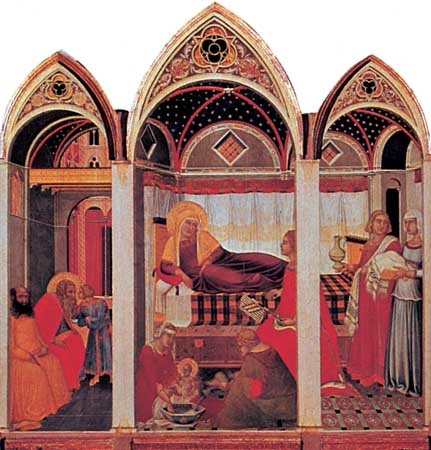Immaculate Conception
Roman Catholicism
 Roman Catholic dogma asserting that Mary, the mother of Jesus, was preserved free from the effects of the sin of Adam (usually referred to as “ original sin”) from the first instant of her conception. Although various texts in both the Old and the New Testaments have been cited in defense of the doctrine, it seems to have arisen from a general acceptance in the early church of Mary's holiness. Especially after Mary had been solemnly declared to be the mother of God at the Council of Ephesus in 431, most theologians doubted that one who had been so close to God could have actually experienced sinful acts.
Roman Catholic dogma asserting that Mary, the mother of Jesus, was preserved free from the effects of the sin of Adam (usually referred to as “ original sin”) from the first instant of her conception. Although various texts in both the Old and the New Testaments have been cited in defense of the doctrine, it seems to have arisen from a general acceptance in the early church of Mary's holiness. Especially after Mary had been solemnly declared to be the mother of God at the Council of Ephesus in 431, most theologians doubted that one who had been so close to God could have actually experienced sinful acts.The view that Mary had been spared also from the disposition to evil inherent in original sin was not clearly articulated until the 12th century, when considerable debate was centred on an English celebration of Mary's conception. The discussion was clouded by medieval views of the biological aspects of conception and by a concern that the belief in the universal redemption effected by Jesus should not be threatened. The latter concern (particularly associated with St. Thomas Aquinas in the 13th century) was countered not long after by the Franciscan theologian John Duns Scotus (Duns Scotus, John), who argued that Christ's redemptive grace was applied to Mary to prevent sin from reaching her soul and that this special intervention resulted in a more perfect redemption in her case. Mary's privilege, thus, was the result of God's grace and not of any intrinsic merit on her part. A gradual acceptance of the Franciscan's views over the next several centuries was reflected in the teaching of various popes (especially Sixtus IV in the late 15th century) and the councils of Basel (1439) and Trent (1546). It was not, however, until Dec. 8, 1854, that Pius IX, urged by the majority of Catholic bishops throughout the world, solemnly declared in the bull Ineffabilis Deus that the doctrine was revealed by God and hence was to be firmly believed as such by all Catholics. The feast of the Immaculate Conception is celebrated on December 8.
- Komura Jutarō
- Komuz languages
- Komárno
- Komárom-Esztergom
- Konarski, Stanisław
- Kondratyev, Nikolay D.
- Kondraty Fyodorovich Ryleyev
- Kondílis, Geórgios
- Konev, Ivan Stepanovich
- konghou
- Kongo
- Kongo language
- Kongs Fjord
- Koniecpolski, Stanisław
- Konin
- Koninck, Philips
- Konishi Yukinaga
- Konitz, Lee
- Konkan
- Konkouré River
- Konkō-kyō
- Konni Zilliacus
- Konoe Fumimaro
- Konopnicka, Maria
- Kono, Tommy